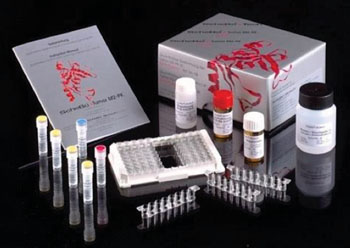Enzyme Signpost Points to Better Bowel Cancer Test
By LabMedica International staff writers
Posted on 21 Mar 2016
A sensitive screening tool for colorectal cancer that detects a special isoenzyme of pyruvate kinase, termed M2-PK, which leaks from the cancerous tissue into the bowel, can then be found in feces. Posted on 21 Mar 2016
One alteration consistently found during tumor formation, including gastrointestinal tumors, is the upregulation of glycolytic enzymes. This upregulation takes place at the ribonucleic acid (RNA) and protein level, as well as at the level of enzymatic activities.

Image: The ScheBo Tumor M2-PK Stool sandwich enzyme-linked immunosorbent assay (Photo courtesy of ScheBo Biotech AG).
The UK Government is currently considering the introduction of a national bowel-screening program. One of the screening tests under consideration is based on the work done several years ago by scientists at the Giessen University Hospital, (Germany) and their colleagues. The team asked patients, given appointments for colonoscopy for various reasons, to provide one stool sample for measuring fecal Tumor M2-PK. Endoscopies were carried out as standard investigations. Histology was obtained from the routine biopsies and/or from surgery. In all, 60 patients with colorectal cancer have been evaluated.
Stool samples of patients with colorectal cancer and patients without pathological findings were tested. Tumor M2-PK was measured with a commercially available sandwich enzyme-linked immunosorbent assay (ELISA) (ScheBo Biotech AG; Giessen, Germany). The ELISA plate is coated with a monoclonal antibody against Tumor M2-PK. Tumor M2-PK from stool samples or standards binds to the antibody. A second monoclonal antibody, which is biotinylated, binds to Tumor M2-PK during the next incubation. Both monoclonal antibodies against Tumor M2-PK specifically react with Tumor M2-PK (dimeric form of M2-PK) and do not cross-react with the other isoforms of pyruvate kinase (type L, R, M1 and tetrameric M2-PK).
There was a highly significant difference between tumor patients and controls. At a cutoff level of 4 UmL-1 the sensitivity was calculated to be 73% and the specificity as 78%. The intra-assay variance was evaluated by 18-fold determination of five samples (5–66 UmL-1), giving an average coefficient of variance (CV) of 7.9% (3.5%–13.6%). The interassay variance was calculated with five samples between 4 and 73 UmL-1, tested on 10 different days. The average CV was 7.3% (3.8%–12.6%).
Robert Souhami, CBE, FMedSci, Director of Policy and Communication for Cancer Research UK, said, “There is currently much interest in this area of investigation. We hope that enzymes such as this one will eventually offer not only useful screening tools, but also an effective method of monitoring bowel cancer patients in remission, so that any return of disease can be quickly detected and acted upon.”
Related Links:
Giessen University Hospital
ScheBo Biotech AG













